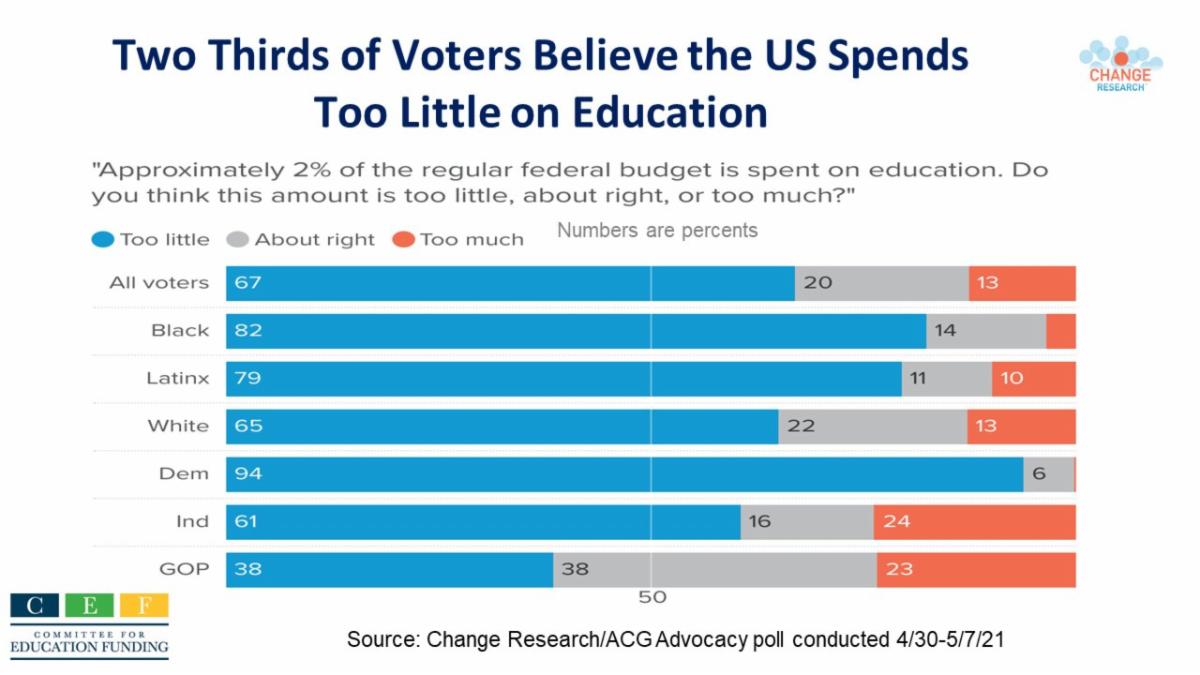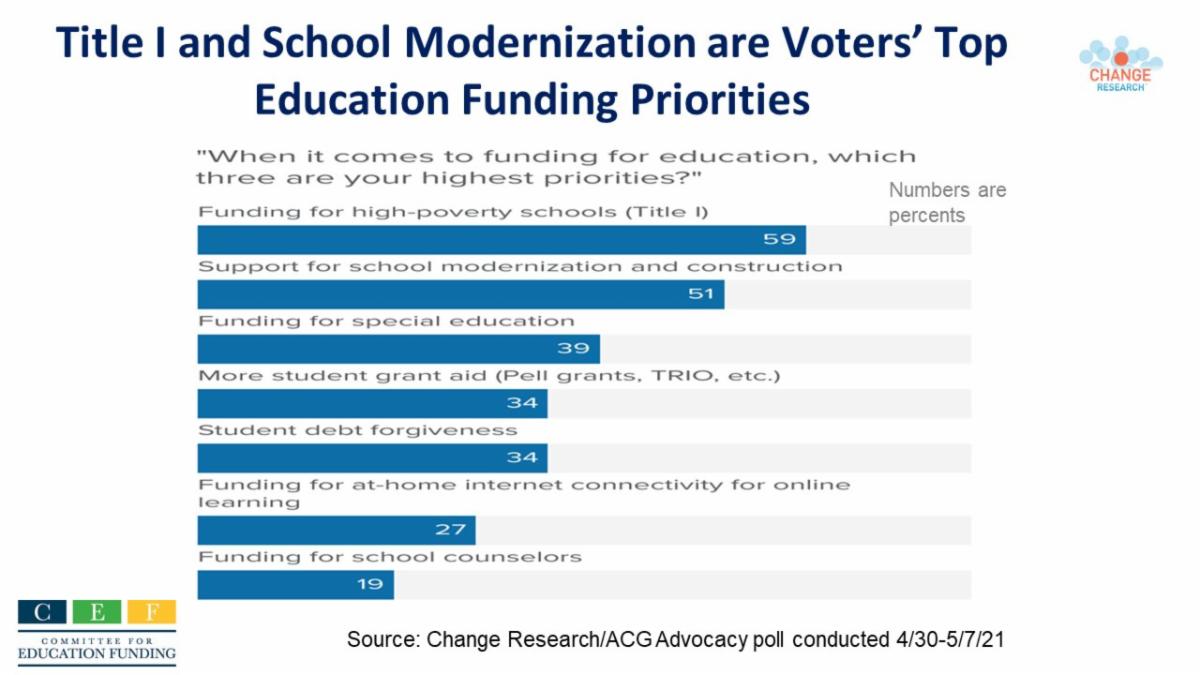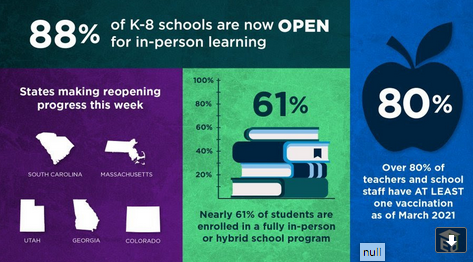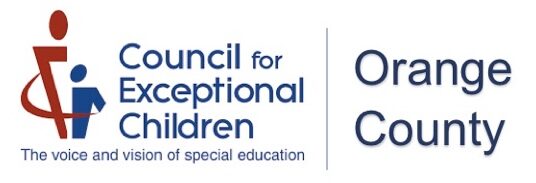From: Education Week’s Edweek Update
May 11, 2021
FDA Green Lights Vaccine for 12 to 15-Year-Olds
The U.S. Food and Drug administration has approved the Pfizer-BioNTech vaccine for emergency use in children as young as 12.
Court Restores Officers’ Immunity Over Seizure of High School Athletes in Peeping Probe
A federal appeals court ruled in the case of two campus officers involved in detaining football camp participants for hours of questioning.
May 13, 2021
Schools Can Help Families Apply for Federal Help in Paying for Home Internet Access
Families who qualify for the free and reduced-price lunch program can get $50 off their monthly broadband bills.
May 14, 2021
$500M for School Nurses Included in Biden Administration’s Latest Virus Response
The government is providing $7.4 billion to expand the nation’s public health capacity, including hiring school nurses to vaccinate kids.
May 17, 2021
What Does the CDC’s New Mask Recommendation Mean for Schools?
The CDC says schools should maintain “layered mitigation strategies,” including mask wearing, for the rest of the school year.
Parents’ Spending on Education Boomed During the Pandemic. Here’s Why
A new analysis found that parents in the U.S. pumped billions more dollars than usual into their children’s education during the pandemic.
May 26, 2021
Moderna’s COVID-19 Vaccine Is Effective and Safe for Adolescents, Study Shows
Biotechnology company Moderna has announced that drug trials show its COVID-19 vaccine is effective and safe for 12- through 17-year-olds.
May 27, 2021
Schools Can Use COVID-19 Relief Money for Vaccinations and Teacher Bonuses, Feds Say
The Education Department’s latest guidance for coronavirus relief packages also says state lawmakers can’t limit how districts use funds.
From: ASCD’s Smartbrief
May 13, 2021
Can K-12 schools require the COVID-19 vaccine?
With the FDA preparing to expand coronavirus vaccine eligibility to children as young as 12, experts say it is still unlikely that states will require K-12 students to receive the vaccine. Requiring the vaccine opens up several legal considerations, and officials say colleges have been more willing to mandate the vaccine because college attendance is not compulsory.
Full Story: Education Week (5/12)
Federal program offers students broadband discounts
President Joe Biden’s administration is urging schools to help encourage eligible families to apply for a new federal program that provides discounts on home broadband services for low-income students meeting certain requirements. The program offers broadband discounts of between $50 and $75 per month and one-time financial support for digital devices for some students.
Full Story: District Administration (5/12), Education Week (5/12)
May 14, 2021
Largest teachers’ unions endorse in-person learning
Schools should fully reopen to in-person learning in the fall, Randi Weingarten, head of the American Federation of Teachers, said Thursday. Becky Pringle, president of the National Education Association, said separately that the NEA also “supports school buildings being open to students for in-person instruction in the fall.”
Full Story: The Associated Press (5/13), The New York Times (5/13), Reuters (5/13)
May 18, 2021
Vaping tied to shortness of breath, wheezing among youths
A study presented at the American Thoracic Society International Conference found that e-cigarette use was linked to higher risks of self-reported asthma, shortness of breath and wheezing, compared with never-users. However, the findings, based on data involving 2,825 current e-cigarette users ages 14 to 21, also showed that there was no longer a link between e-cigarette use and asthma when the researchers controlled for cannabis and cigarette use in the past 30 days, but the association with a higher risk for shortness of breath and wheezing persisted.
Full Story: Healio (free registration) (5/14)
May 20, 2021
Would Biden’s universal preschool be worth the cost?
Almost half of all US 3-year-olds and a third of 4-year-olds did not attend preschool, according to 2019 data from the National Institute for Early Education Research. President Joe Biden wants to spend $200 billion to provide two-year universal preschool, with economists in this article sharing the outcomes of students who were admitted by lottery to Boston’s universal preschool program in the 1990s.
Full Story: National Public Radio (5/18)
May 25, 2021
Mask use, ventilation curb COVID-19 incidence in schools
CDC researchers found that COVID-19 incidence was 37% lower in elementary schools that required mask use among staff members and teachers and 39% lower in schools that upgraded ventilation. The findings in the agency’s Morbidity and Mortality Weekly Report also showed that dilution methods like using fans and opening windows and doors lowered the incidence of COVID-19 in schools by 35%, and when combined with filtration methods, the incidence was reduced by 48%.
Full Story: Healio (free registration) (5/21)
May 26, 2021
School districts mull standardized testing plans
Some school districts in the US are scaling back traditional standardized exams because of the coronavirus pandemic by testing just some students or opting out entirely. Following requests that President Joe Biden’s administration cancel standardized tests again this year, the US Education Department asked that states test as many students as they can, but not require students to go to school just to administer exams.
Full Story: The Associated Press (5/22)
May 27, 2021
Children could be more at risk of COVID-19 variants
Some health experts are concerned that schoolchildren could be vulnerable to variants of the coronavirus. Children in England have been particularly affected by recent outbreaks there, and officials say this is a concern because children younger than age 12 are not yet approved for COVID-19 vaccines.
Full Story: CNN (5/26)
May 28, 2021
Education Dept. fact sheet offers rescue funding guidance
Nonbinding guidance released by the Biden administration covers various ways money from the American Rescue Plan and other COVID-19 relief funding can be used by school districts, from vaccines to layoff prevention. However, state education departments may limit how much of the money can be used for administrative oversight.
Full Story: Education Week (5/26)
Survey: Effects of pandemic on moms could affect kids
Added stress experienced by mothers during the coronavirus pandemic may be affecting children, according to a report released by the Rapid Assessment of Pandemic Impact on Development-Early Childhood. Data shows one-third of mothers with young children stopped working or cut back their hours during the pandemic — and were more likely to experience anxiety, depression and other effects.
Full Story: The Hechinger Report (5/27)
From: Special Education Smartbrief
May 12, 2021
Study: Device age affects online learning
The quality of students’ devices — particularly the age of the device and device specifications — significantly affect their remote-learning experience, according to a report from the Consortium for School Networking. The report finds these factors affected upload and download speeds.
Full Story: T.H.E. Journal (5/11)
Internet-delivered cognitive behavioral therapy examined
Researchers found that treating youths who had obsessive-compulsive disorder with an internet-delivered cognitive behavioral therapy program followed by traditional in-person therapy if necessary was non-inferior, compared with face-to-face cognitive behavioral therapy alone. The findings were published in the Journal of the American Medical Association.
Full Story: Physician’s Briefing/HealthDay News (5/11)
May 17, 2021
CDC: Masks should still be worn in schools
The CDC maintains that K-12 schools should continue to have students and staffers wear masks and keep physically distant through the end of the school year. The CDC offered clarification on its school recommendations this weekend after it relaxed some of its mask-wearing protocols for the general public.
Full Story: The New York Times (5/15)
May 19, 2021
Bill would give all US students free meals
Rep. Gwen Moore, D-Wis., and other lawmakers are sponsoring a bill that would make school meals free for all US students, no matter their income level. “One of the things that we have found already is just basically feeding children improves their performance in school, improves attendance, behavior,” Moore said.
Full Story: Milwaukee Journal Sentinel (tiered subscription model) (5/18)
May 24, 2021
Guidelines issued for return to in-person special ed
The US Education Department recently released a Q&A document outlining expectations for the reopening of schools with regard to students with disabilities. Guidelines cover in-person, remote and hybrid classrooms and address topics such as mask-wearing and inclusive classrooms.
Full Story: Disability Scoop (5/21)
From: Whiteboard Advisors’ WHITEBOARDNOTES
May 14, 2021
U.S. Department of Education Announces $36 Billion in Emergency Grants to Higher Ed Institutions: On Tuesday, the Department of Education made $36 billion in emergency funding available for higher education institutions through the Higher Education Emergency Relief Fund. This third round of funding, authorized by the American Rescue Plan Act of 2021, includes $10 billion for community colleges, $2.6 billion for HBCUs, $190 million to tribal colleges, and $6 billion to other minority-serving institutions. Colleges can use the aid – allocated based on a formula that includes each institution’s relative shares of Pell Grant recipients and non-Pell Grant recipients – to disburse emergency grants to students deemed by their institutions to have exceptional need, regardless of their citizenship or FAFSA status. The funding may also be used for student retention efforts or to cover institutional costs, and institutions must use part of their funding on “evidence-based practices” for monitoring and suppressing the coronavirus and on direct outreach to financial aid applicants alerting them of the opportunity to receive a financial aid adjustment. [U.S. Department of Education; Inside Higher Ed]
Lawmakers Press CDC About Teachers’ Union Influence on School Reopening Guidance: Republican senators pressed CDC Director Dr. Rochelle Walensky Tuesday about recent reports that the American Federation of Teachers had input on the agency’s guidance on school reopenings. Walensky denied accusations of accommodating special interests in the agency’s guidance and echoed earlier comments by White House officials that federal health officials reached out to varying groups to ensure their recommendations were informed by the realities they face. [The New York Times; Education Week, subscription required]
May 21, 2021
School Bus Driver Shortage Worsens: As schools across the country reopen for in-person instruction, school bus driver shortages have continued to grow. According to a March survey, nearly four-fifths of school transportation professionals including superintendents, directors of transportation, and school transportation staff said the bus driver shortage was a problem for them. In a year during which many school bus drivers were furloughed or out of work for extended periods, many have sought other jobs or retired. Others have decided not to return in order to reduce the risk of contracting COVID-19. The shortage has been further exacerbated by mandates that buses operate at half-capacity, which requires a larger number of drivers. Districts have taken a variety of approaches to solving this problem, from reducing bus service, to re-aligning bell schedules, to offering additional training and benefits to new and existing drivers. [Education Week]
From: The National Superintendents Roundtable’s Roundtable News
May 14, 2021
One fifth of students behind in traditional vaccinations
Let’s not get so hung up on COVID-19 that we ignore the reality that one fifth of students are behind on traditional vaccinations for such communicable diseases as measles and meningitis. CDC estimates that 20 years of vaccinations “prevents . . . 732,000 deaths over the course of children’s lifetimes.” Source: https://www.getvaxfacts.org
May 21, 2021
Two thirds of voters want more school funding
The Committee for Education Funding reports that an ACG Advocacy/Change Research nationwide poll reports significant support for increased funding for K-12 education. Two thirds of voters believe the U.S. spends too little on education.
Asked about priorities for additional funding, voters put increased funding for Title I and for school modernization at the top of the list. Nearly 40% of voters want more money spent on special education, and more than one quarter cite the need for improved home internet connectivity.


54% of K-8 schools open for full-time in-person learning
Under Secretary Miguel Cardona the Department of Education has started using the NAEP national sample of elementary and middle schools to probe school re-opening. Reports of these results lag significantly behind administration of the surveys.
In a May 6 statement, the Department reported that 54% of K-8 schools are open for full-time in-person learning as of the March administration of the NAEP survey. Encouragingly, 88% are open for either full-time in-person or hybrid instruction. Undoubtedly these numbers have increased significantly since March.
More work is needed but there are also positive trendlines for students of color enrolled in in-person learning since January.

Will we reach herd immunity?
Not enough people are getting vaccinated in order for the country to reach herd immunity, say experts. This means there will continue to be outbreaks. Learn more in this Q&A with Dr. William Petri at The Conversation.
Herd immunity occurs when enough people have been vaccinated that the spread of infection ceases. Polio and measles have reached herd immunity in the United States and many other countries, says Petri. Smallpox has reached herd immunity out across the globe.
Two challenges continue to face the United States, according to Petri: Not every adult is receiving the vaccine because of “vaccine hesitancy.” And there is a constant possibility of the reintroduction of infection from other countries where vaccination is not as readily available as it is in the U.S.
May 28, 2021
Are 4,000 + superintendents getting ready to bail out?
A lauded superintendent in Santa Rosa, California is getting ready to step down after years of crisis. “I don’t want to become bitter,” she says.
One estimate is that 4,000 – 5,000 superintendents might call it quits this year, Stephen Sawchuk writes in a profile of Diann Kitamura for Education Week.
The estimate may be high, but there seems little doubt that for many school leaders the pandemic has served as a tipping point. The superintendency is a tough job in the best of times. Heated arguments about school policies during the pandemic has only added to the stress. As Dan Domenech of AASA has pointed out it’s impossible to keep everyone happy in an environment in which half the parents want the schools fully reopened and half cling to distance learning.
From: The Council for Exceptional Children’s Special Education Today
May 14, 2021
Eye movements of those with dyslexia reveal laborious and inefficient reading strategies
Concordia University via Science Daily
A new article used eye-tracking technology to record eye movements of readers and concluded that people with dyslexia have a profoundly different and much more difficult way of sampling visual information than normal readers.
A closer look at Biden’s $1.8T for families and education
The Associated Press
President Joe Biden’s administration wants to make a $1.8 trillion down payment on the future of children, families and higher education, saying it would produce lasting benefits for the economy. Paying for it would be $1.5 trillion of tax hikes over the next decade on the wealthiest households.
May 21, 2021
Youngest children in class more likely to be diagnosed with learning disability
University of Turku via Science Daily
Children born in December are almost twice as likely to be diagnosed with a learning disorder as those born in January in school districts with a December 31 cut-off date. ADHD was found not to affect the association between month of birth and the likelihood of a learning disability diagnosis.
Remote learning still widespread even after Biden hits goal
The Associated Press
President Joe Biden has met his goal of having most elementary and middle schools open for full, in-person learning in his first 100 days in office, according to new survey data, but the share of students choosing to return has continued to lag far behind. The survey, conducted in March by the Education Department and released Thursday, found that 54% of public schools below high school were offering full-time classroom learning to any student who wanted it. It marks steady progress since January, when the figure was 46%.





